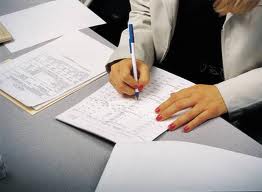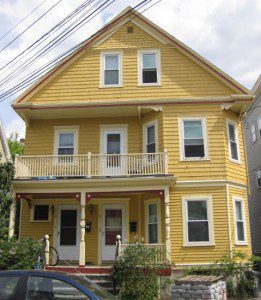Tax time for the two-family homeowner
There are significant tax advantages for a landlord. Landlords run their rentals as a business. The business of being a landlord has its own tax schedule, Schedule E.
 These are the records a landlord needs to keep for their accountant or tax preparer:
These are the records a landlord needs to keep for their accountant or tax preparer:
1. Total rent income.
2. Repair expenditures, detailed with date, who was paid, and what was done.
3. Maintenance expenditures, which include cleaning costs, trash pick-up fees and such.
4. Total property insurance.
5. Interest payment on the mortgage.
6. Property tax payment for the property.
7. Total water bill. If the landlord pays utilities, then utility bills, too.
8. Incidental bills related to renting, like fees for credit checks, bank fees, tax preparation, fees for management, fees for expenses to collect the rent, legal fees.
When you first set up the business of owning a rental, your accountant will need your initial expense information, and the municipal assessor’s record to start the depreciation of your asset (the rental property.)
For an owner-occupied two-family, the repairs are divided into owner’s unit, tenant’s unit and common areas. Repairs to the owner’s unit are the owner’s expense – no tax benefit. The tenant’s unit repairs offset the income tax on the rental income. The common area repairs are credited against the rental income by the percentage of the house that is rented. The accountant or tax preparer finishes calculating the expenses for the part of the property that is rented, plus depreciation.
For a landlord who doesn’t live there, the yours-mine-ours doesn’t apply. All the expenses can be used to offset the rental income.
Every year, based on the ongoing cost of running the rental unit, the tax preparer can estimate next year’s repair budget. That’s the highest amount a landlord can spend annually on repair that would offset the rental income for tax purposes. (The rules about what is a repair and what is a capital improvement changed in recent years. Explaining the difference is beyond what I know; so ask your preparer.) Improvements are not tax deductible, but will depreciate.
Landlords who depend on the rental income for their living income can’t afford to offset all their income in repair. For bigger, more professional landlords, their goal is to turn a profit. If there is income, there are income taxes.
 Keeping a rental property in good repair is good business. The tax structure supports it. If a landlord can afford to put the rent money back into the property, the property pays back with fewer repair emergencies, better tenants, higher rents, and lower income taxes on rents collected.
Keeping a rental property in good repair is good business. The tax structure supports it. If a landlord can afford to put the rent money back into the property, the property pays back with fewer repair emergencies, better tenants, higher rents, and lower income taxes on rents collected.